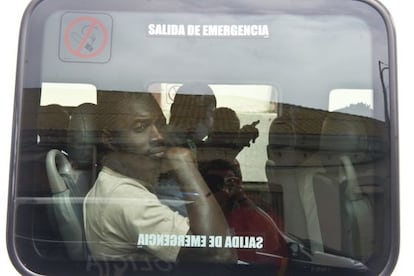The €4,000 shortcut across the Strait
Mafia groups are offering to take illegal migrants from Morocco to Spain in just 15 minutes

There is a much shorter way to get across the Strait of Gibraltar than the route used by most African immigrants seeking a new life in Europe.
Those who do not wish to spend several days and nights bailing water out of inflatable rafts after months spent waiting in Tangier or Casablanca for a chance to make the crossing will need money. Lots of it.
For 40,000 dirhams (€4,000), undocumented migrants can ride on powerful water scooters that take barely 15 minutes to cover the distance from Morocco to the Spanish mainland. The price includes a pair of sunglasses and clean clothes upon arrival, to make detection harder.
And the mafias also offer hefty discounts to clients willing to carry drugs into Spain at the risk of getting caught and sent to prison. Bringing in 20 kilos of hashish, for instance, reduces the bill to €1,000.
The price includes a pair of sunglasses and clean clothes upon arrival, to make detection harder
Spanish customs officials know it, and have detected dozens of cases in the last few months. On August 7, the Civil Guard arrested three members of a ring that was trying to bring a migrant into La Macotilla beach, just a few kilometers from Tarifa.
One officer who took part in that operation said that water scooters are making this kind of journey on a daily basis. “They try every day and many of them make it,” he admitted on condition of anonymity. “And some even arrive with a little package under their arm.”
Algeciras law enforcement officials on La Macotilla beach also seized 67 kilos of hashish inside two suitcases, which the occupants of the water scooters threw into the sea after police closed in on them.
Government opens new police facilities to process migrants
The Spanish government has been forced to open two new facilities at police stations in Cádiz and San Fernando to deal with the massive influx of migrants who arrived in boats last week.
A total of 1,219 sub-Saharan immigrants landed on Spanish soil in 130 flimsy inflatable rafts of the kind that are sold for around €80 at many stores in Morocco. The figure is a record and suggests that human trafficking rings are once again favoring sea crossings after a hiatus of several years during which the preferred mode of entry was over the border fences separating Morocco from the Spanish north African exclaves of Ceuta and Melilla.
The Spanish government recently installed anticlimb mesh on the fences, making this route into Spain much more difficult for illegal migrants.
The new arrivals have overwhelmed many immigrant holding centers. On Sunday over 400 migrants still remained under the care of the Red Cross inside two sports centers in Tarifa (Cádiz). Police have been struggling to identify all the new arrivals before sending them on their way with deportation orders that are unlikely to be enforced. Although protocols establish that they must be transferred to centers where they will be under surveillance, in practice many have been referred to non-profit groups with no oversight capabilities.
Police sources familiar with the situation told EL PAÍS that they have been overwhelmed and that it is near impossible to confirm the veracity of the names and nationalities provided by the migrants, who all claim to hail from countries with no repatriation agreements with Spain.
Tu suscripción se está usando en otro dispositivo
¿Quieres añadir otro usuario a tu suscripción?
Si continúas leyendo en este dispositivo, no se podrá leer en el otro.
FlechaTu suscripción se está usando en otro dispositivo y solo puedes acceder a EL PAÍS desde un dispositivo a la vez.
Si quieres compartir tu cuenta, cambia tu suscripción a la modalidad Premium, así podrás añadir otro usuario. Cada uno accederá con su propia cuenta de email, lo que os permitirá personalizar vuestra experiencia en EL PAÍS.
En el caso de no saber quién está usando tu cuenta, te recomendamos cambiar tu contraseña aquí.
Si decides continuar compartiendo tu cuenta, este mensaje se mostrará en tu dispositivo y en el de la otra persona que está usando tu cuenta de forma indefinida, afectando a tu experiencia de lectura. Puedes consultar aquí los términos y condiciones de la suscripción digital.









































